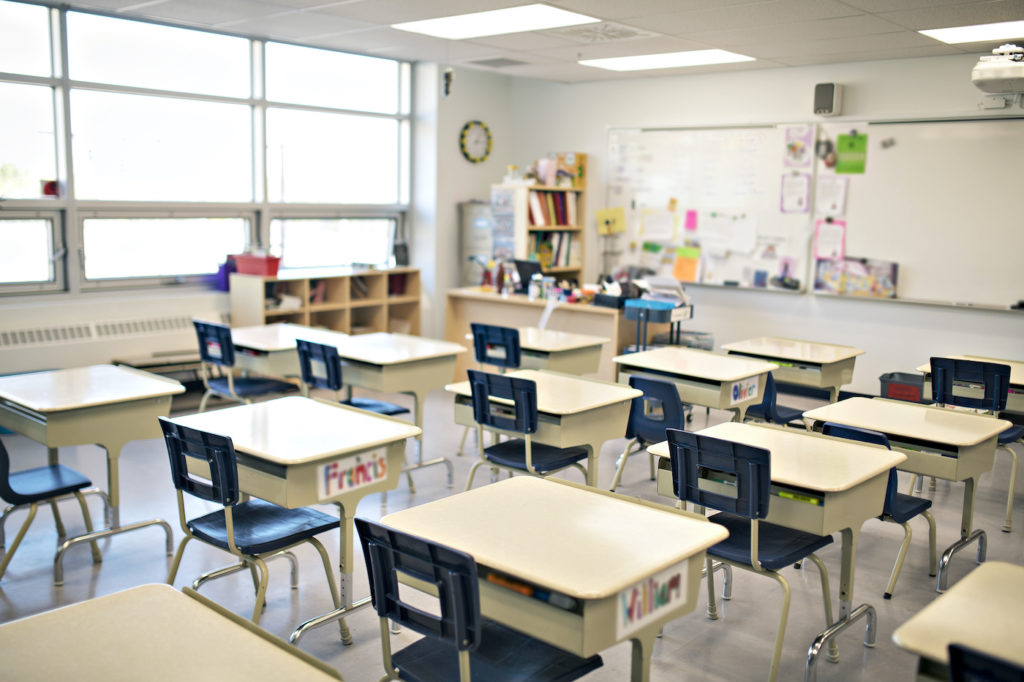As evidenced by parents’ pushback against the hyper-politicization of K-12 curricula, schooling that short-circuits parental influence isn’t holding up well under scrutiny. But whether parents can regain real influence in public education remains an open question—one that I will return to later.
The Politicization of Schools
The blunt truth is that many schools, even in red states, have embraced curricula and policies that for most observers would have been inconceivable a short time ago. Kids are taught a vastly oversimplified view of race that too rigidly considers some groups victims and others oppressors. Many schools are also teaching kids that they are sexually autonomous—suggesting that sexual pleasure is a right and that their gender is malleable. But these changes have long been underway.
How did this happen? There are many reasons, but one is especially worth mentioning: the American education establishment’s intense ideological commitments.
Start your day with Public Discourse
Sign up and get our daily essays sent straight to your inbox.What many don’t realize is that most of America’s education professionals—meaning government bureaucrats, administrators, and teachers—have been trained in an educational philosophy driven by progressive politics. Whether in Mississippi or in California, much of America’s school staff attended colleges of education that teach similar, politically infused educational philosophies. The more graduate degrees earned, the more teachers and administrators are exposed to these ideas.
This approach to education credentialing has been devastatingly effective in influencing what’s taught in K–12 schools. Bill Ayers (literally a terrorist who vandalized stores and attacked police and other officials) became a professor of education, realizing that from an influential perch in Education World, he and his like-minded colleagues could shape education colleges and the administrative and teacher corps they churn out. A profession that reveres not only Ayers but progressive activists such as Dr. Bettina Love, who rails against “Eurocentric, elitist, patriarchal and dehumanizing structures of racial capitalism and its liberal underpinnings,” is a profession that needs to correct course and heed parents’ voices and concerns.
So as time goes by and the more seasoned teachers and administrators retire, the current education establishment’s methods and philosophy have begun to define the profession. And when private and religious schools draw their employees from the same pool, with the same requirements for degrees in education-related courses (rather than subject-specific classes in English, math, history, etc), this hyper-political pedagogy spreads to those non-public schools as well.
Whether in Mississippi or in California, much of America’s school staff attended colleges of education that teach similar, politically infused educational philosophies. The more graduate degrees earned, the more teachers and administrators are exposed to these ideas.
Schooling and Sexuality
Activism in education schools has also led to inappropriate discussions of sexual orientation and gender identity across all age cohorts in K–12 education. Young children are now regularly exposed not only to sexual discussion in general but to affirmation of a multitude of non-heterosexual behaviors and identities—long before they can understand these concepts and contextualize them within their families’ values and religious faiths.
Indeed, the National Sex Education Standards, offered by far-left organizations Advocates for Youth, Answer, and SIECUS, suggest that discussions of sexual orientation begin at least by the end of fifth grade and of gender identity even earlier, by the end of second grade (second-graders are typically seven years old). The schools are deliberately beating parents to the punch on conversations about these sensitive topics, discussing them with kids before parents would even consider doing so.
Predictably, this propaganda has increased the number of children and youth who identify on the ever-expanding spectrum of sexual identity and behavior: gay, lesbian, non-binary, genderqueer, gender fluid, transgender, etc. One 2020 study estimates that 9.5 percent of minors aged 13 to 17 now identify as some form of LGBT. This represents a cataclysmic increase from levels of under 2 percent for homosexual and well under 1 percent for transgender in decades past.
Any honest observer would have to admit that such numbers represent a problem for a healthy culture. Even discounting the challenges these trends pose to marriage, families, and general human flourishing, radical advocates themselves continually warn of the fragile mental health and increased suicidality of these kids (though they place the blame on an unaccommodating culture).
To combat mental-health difficulties among LGBT-identifying youth, it is argued, education on these topics should begin even in preschool and kindergarten—teaching LGBT concepts in a manner that is “age appropriate,” with age-appropriateness to be determined by radical sex educators. Otherwise these children will harm themselves. The idea of leaving this problem to what activists consider out of touch and unsympathetic parents is dismissed as a threat to children’s lives.
The schools are deliberately beating parents to the punch on conversations about these sensitive topics, discussing them with kids before parents would even consider doing so.
Can Parents Win?
But most parents don’t want their children exposed to this material, any more than they want their children learning about the reductive racial binaries suggested by Critical Race Theory. The recent gubernatorial results in Virginia, as well as similar parent movements elsewhere, illustrate the end of parental trust in schools as the best institutions for educating students and setting them up for life success. With substantial parental support, multiple states have begun to pass legislation to diminish the woke wave in K-12 public schools (e.g., several states’ ban on CRT indoctrination, Florida’s prohibition on teaching sexual orientation and gender identity concepts to children in third grade and younger, and even progressive San Francisco parents’ recall of three school board members).
But the question is, can parents really retake control of public education?
The relentless leftward tilt of education administrators and teachers (along with the power of teachers’ unions in many states) presents a daunting challenge to those trying to reverse the tide. Not only are too many of these educators true believers, but in many cases they’ve expressed their intent to pursue their progressive course regardless of what parents and even legislatures want—and their willingness to use stealth tactics if necessary (see here and here). And of course, in some states such as California, schools are mandated to teach concepts that many parents find anathema.
This isn’t to say resistance is futile. The more wrenches that are tossed into the gears of the left’s education machine, the more the plan is disrupted. At the very least, such pushback delays implementation of the agenda. And vigilant parents can work with energized local school boards to implement high-quality, non-woke curricula (e.g., see here and here).
But parents must understand that eternal vigilance will be required. They will have to monitor everything that happens at their child’s school—every class in every subject, every assignment, every online resource (which is sometimes impossible because parents may not have access), every school assembly, every after-school activity, every survey administered, every conversation with a school counselor, every school board meeting. There are ways to do it, but it requires focus, organization, and serious strategizing.
If this sounds exhausting, parents should seriously consider other possibilities. Private school may be an option, but some will charge large sums to deliver essentially the same product. No checks should be written to private schools until pointed questions are answered satisfactorily.
What are the other possibilities? One would be finding a school that teaches a classical curriculum. Many of these are private, but a growing number of charter schools—which are public and therefore tuition-free—are pursuing the classical route. Theoretically a classical school could include objectionable woke material in its offerings, but unless the state requires it, that’s less likely to happen in a curriculum based on the best of Western civilization. A classical curriculum leaves little time for frivolous nonsense.
Of course, most families don’t currently have access to a classical school. But that may be changing. Great Hearts Academies, which operates 33 classical charter schools in Arizona and Texas, is expanding to Great Hearts Online (GHO) to offer tuition-free virtual schooling to the rest of the nation. Virtual education has suffered a blow to its already weak reputation during the pandemic shutdowns, but initial results from GHO are promising. Other classical providers, including those grounded in the Catholic faith, may be expected to enter the market.
The bottom line is that, despite glimmers of hope, parents are fighting an uphill battle to restore their rightful control over public education and their preeminent role in the formation of their children.
Homeschooling has also exploded during the pandemic shutdowns. The U.S. Census reports that homeschooling households more than doubled from the beginning of the 2019–2020 school year to the 2020–2021 year. Legions of parents became fed up with school shutdowns. They realized from seeing their children’s virtual lessons how much of the content was objectionable anyway. Plus parents were quickly wearied of the over-the-top COVID mitigation policies implemented when the schools grudgingly reopened.
Many parents, though, are wary of homeschooling because they either have jobs or simply feel overwhelmed by the prospect. Here’s where the light of creativity can shine.
Covid shutdowns prompted the creation of “pandemic pods,” in which multiple families join together to hire one or more tutors for their children. There are numerous variations on this theme. Some teacher refugees from the public and private school system—those who bowed out under the weight of wokeness or other shortcomings of the schools—may be hired by one or more pods and increase their income in the process. Or one or more pod parents may take on instructional duties, perhaps in a hybrid plan with the better online programs such as Great Hearts.
The bottom line is that, despite glimmers of hope, parents are fighting an uphill battle to restore their rightful control over public education and their preeminent role in the formation of their children. The moment to create new avenues and grow existing alternatives is now. It’s time to let a thousand flowers bloom.














